Turning Points in Christian History 1
Chris Knepp
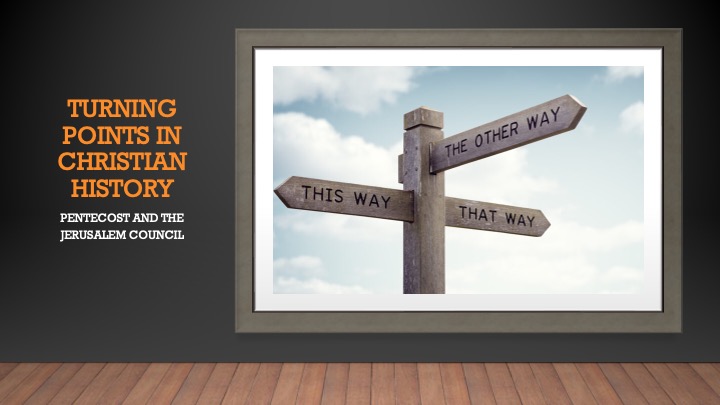
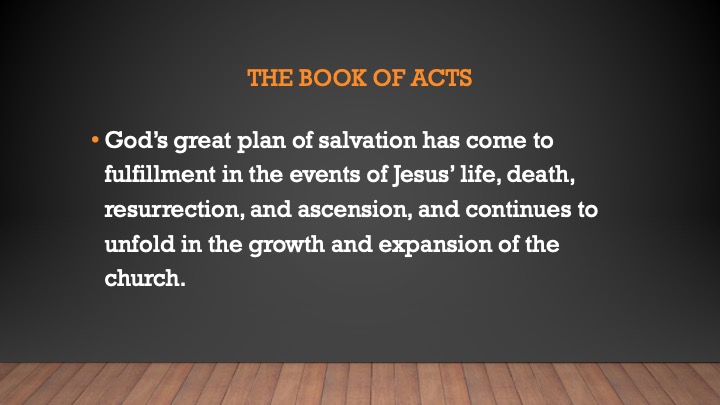
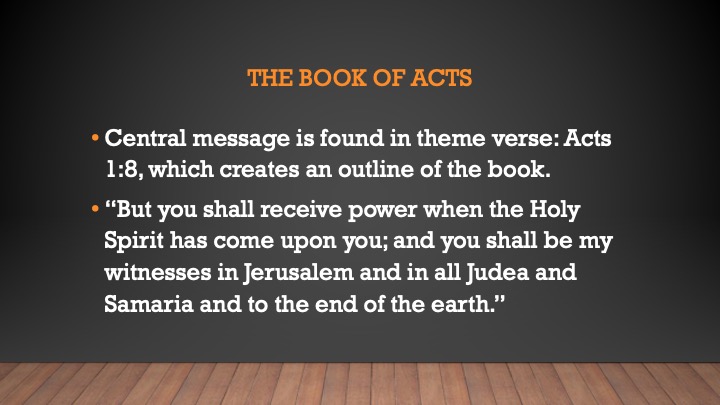
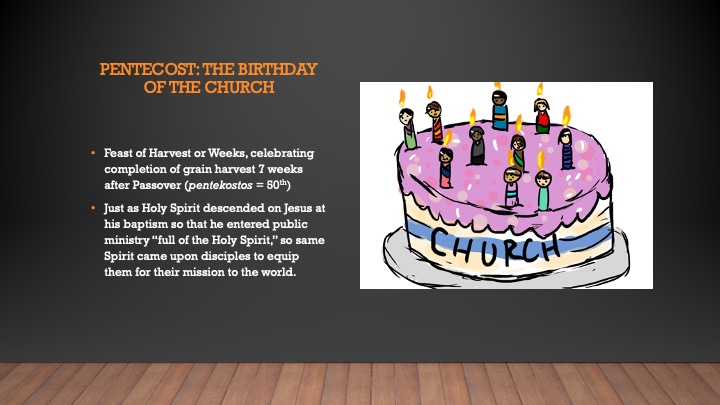
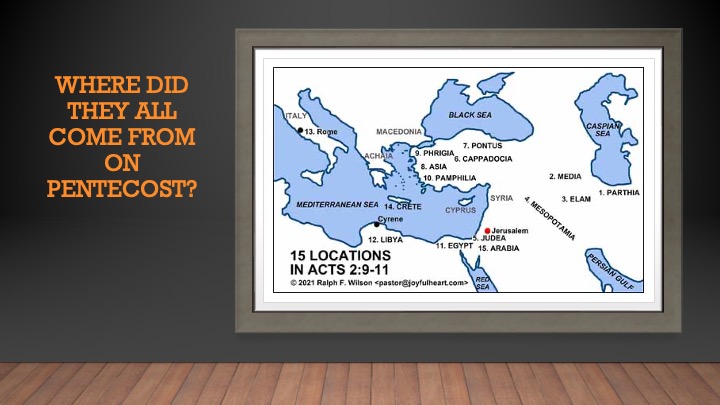
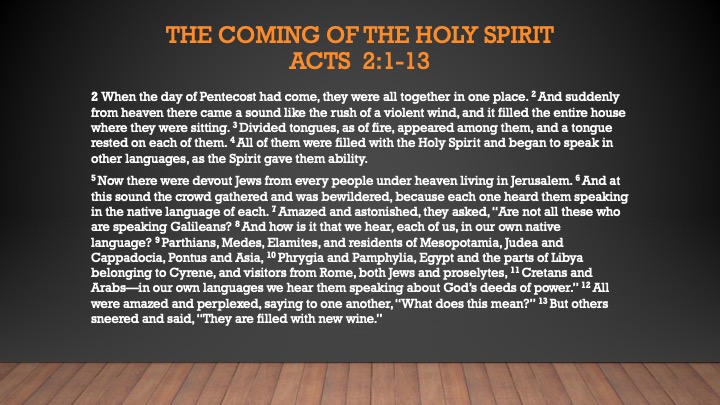
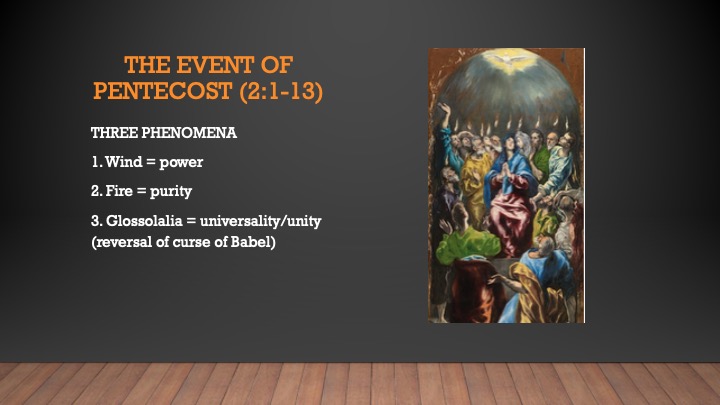
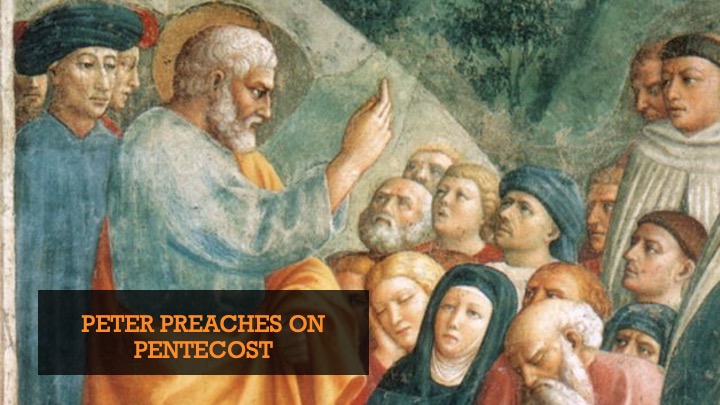
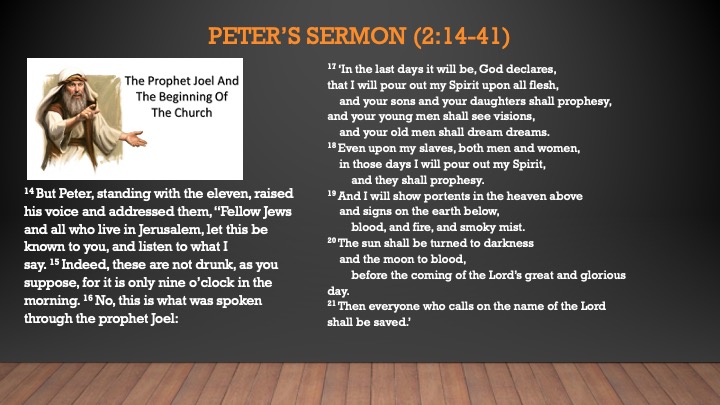
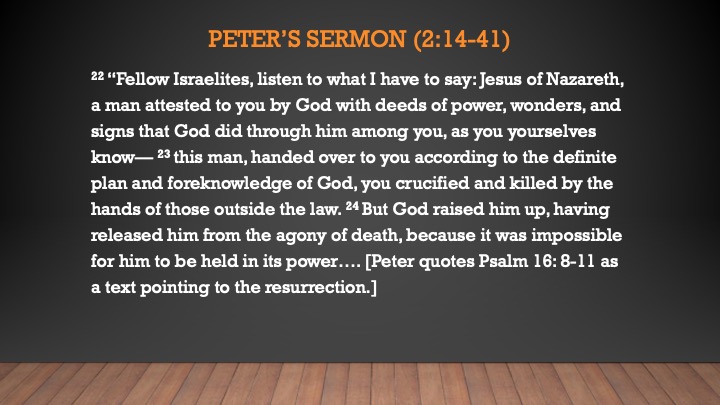
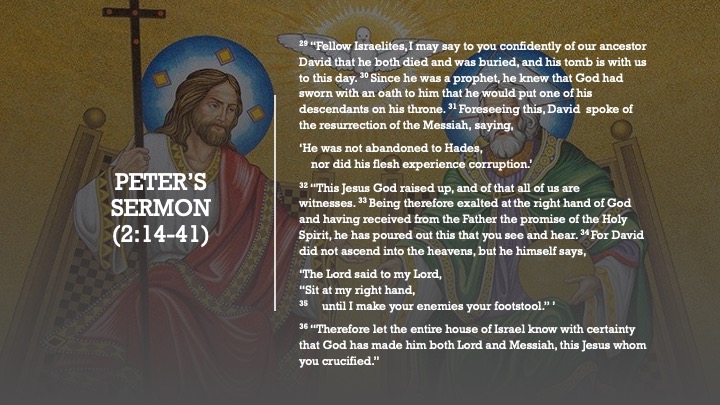
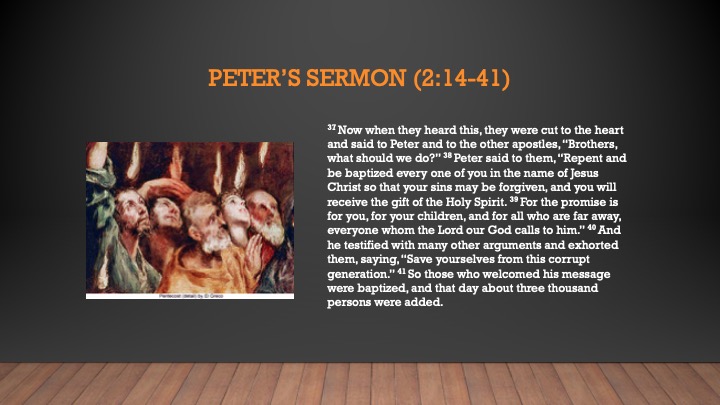
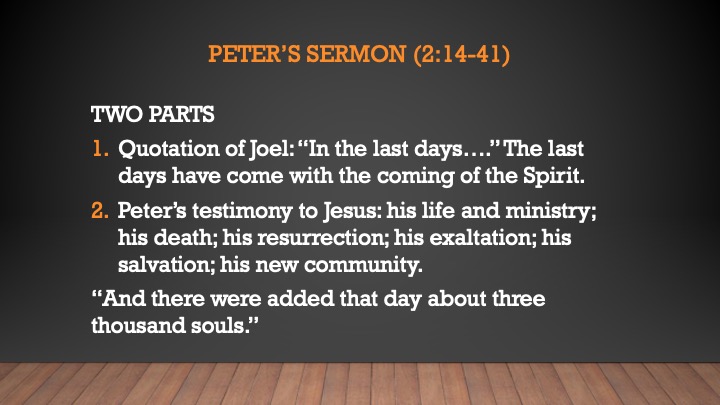
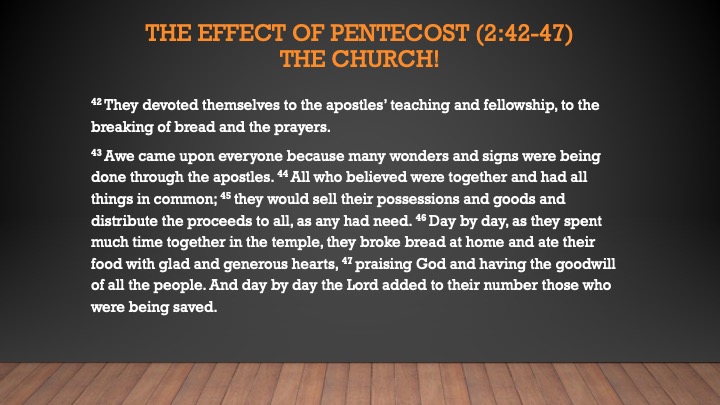
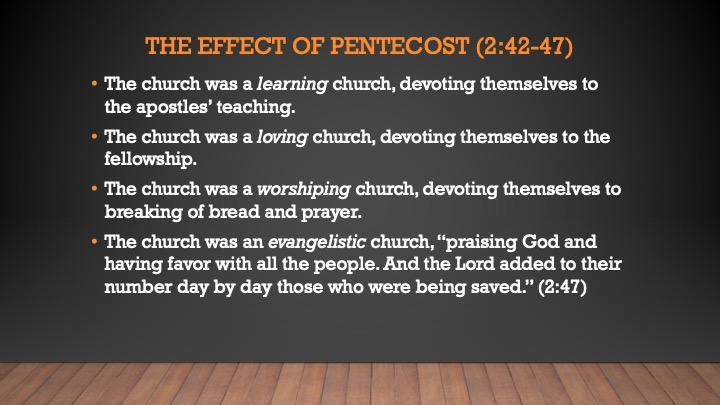
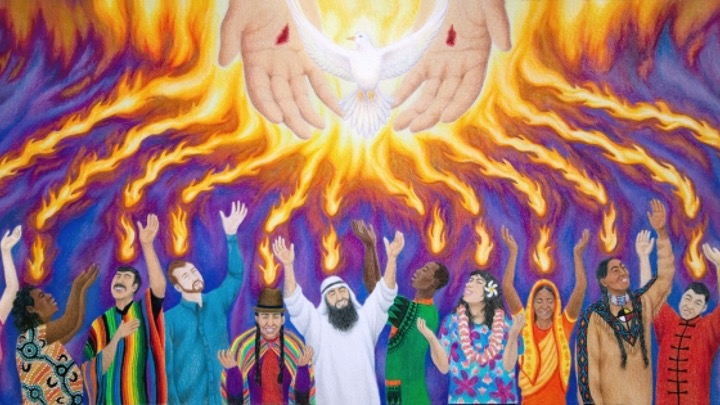
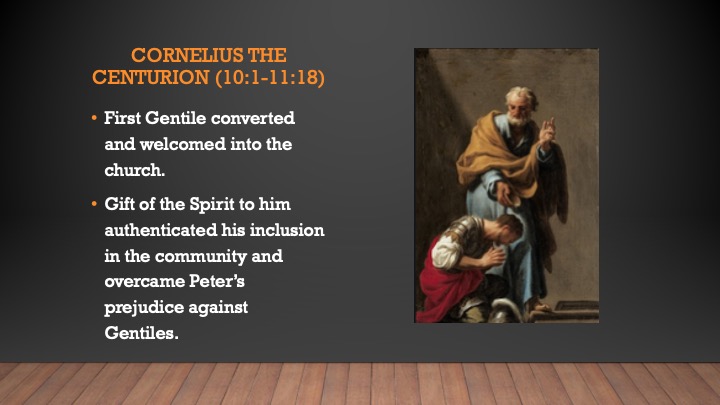
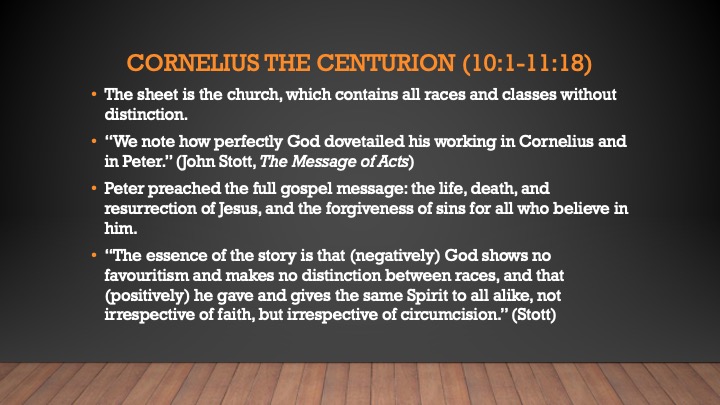
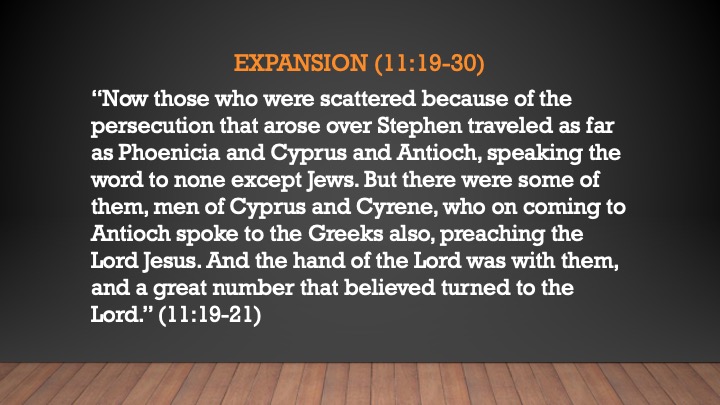
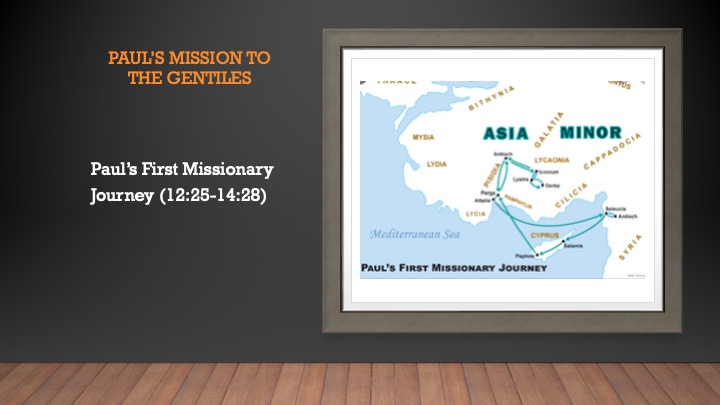
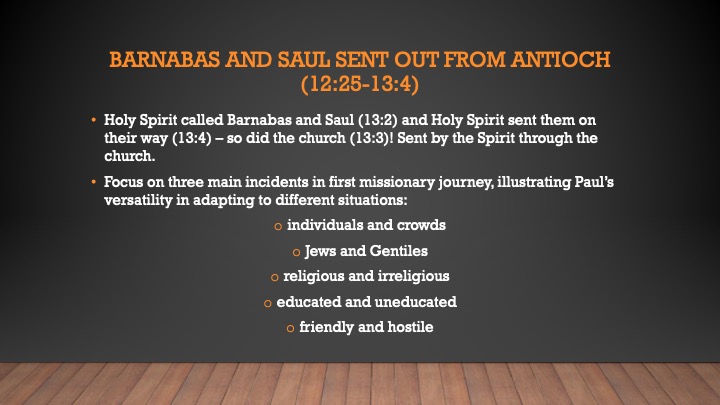
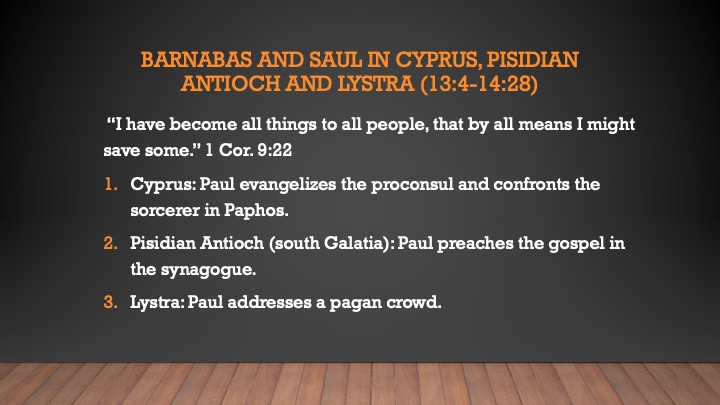
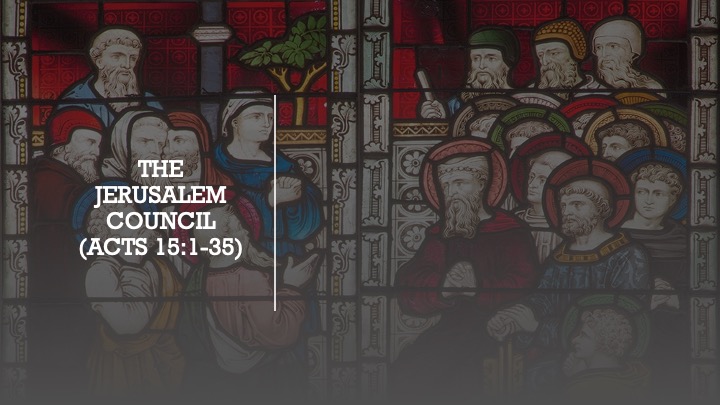
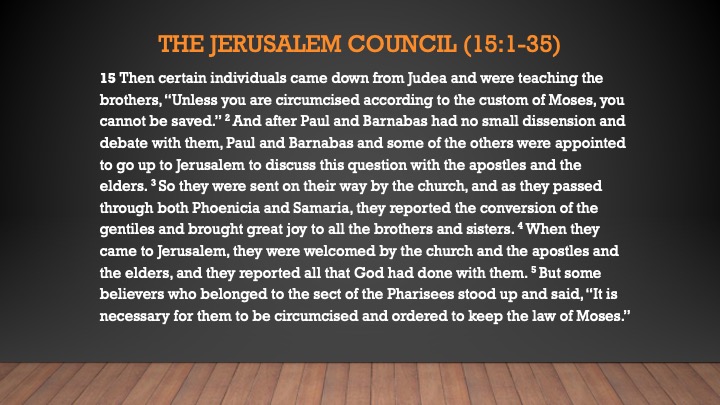
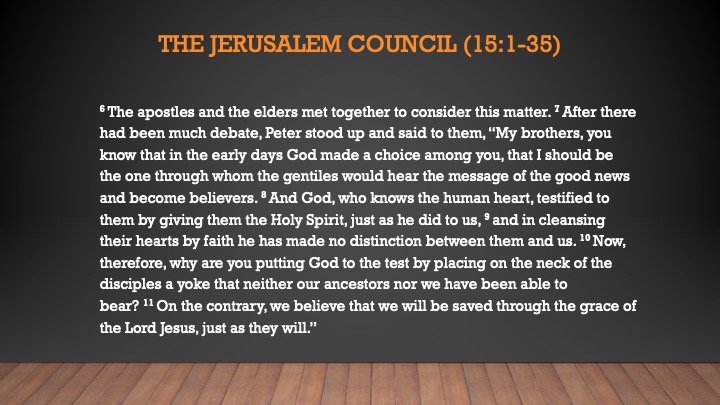
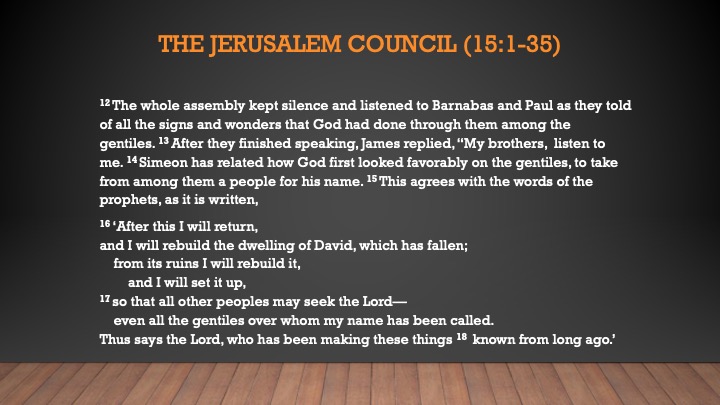
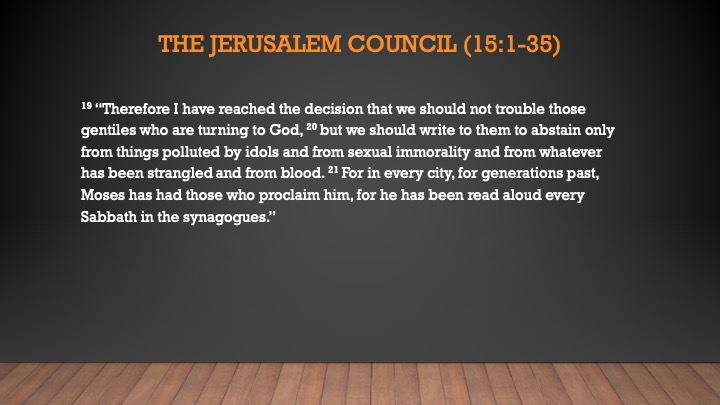
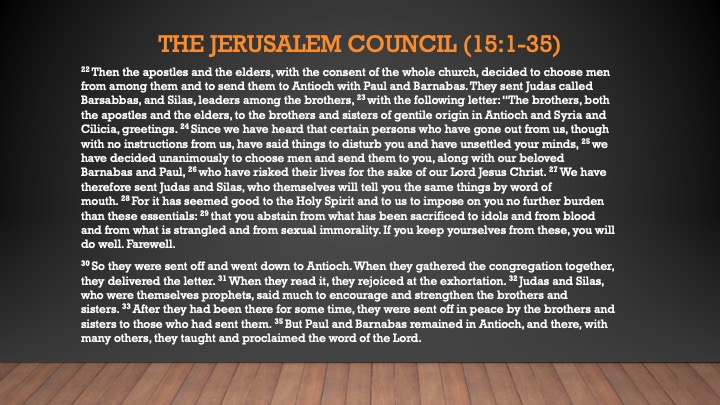
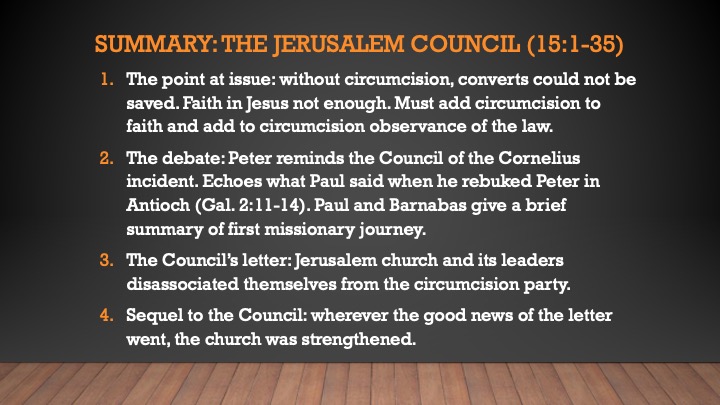
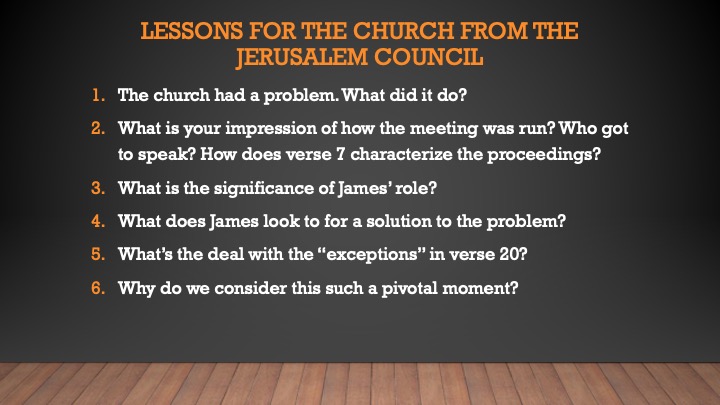
Turning Points in Christian History 1
Links
<< Home >> << Turning Points Menu >>
Turning Points in Christian History 1 - the Text
Turning points in Christian History
Pentecost and the Jerusalem council
The Book of Acts
• God’s great plan of salvation has come to fulfillment in the events of Jesus’ life, death, resurrection, and ascension, and continues to unfold in the growth and expansion of the church.
• Central message is found in theme verse: Acts 1:8, which creates an outline of the book.
• “But you shall receive power when the Holy Spirit has come upon you; and you shall be my witnesses in Jerusalem and in all Judea and Samaria and to the end of the earth.”
Pentecost: the Birthday of the Church
• Feast of Harvest or Weeks, celebrating completion of grain harvest 7 weeks after Passover (pentekostos = 50th)
• Just as Holy Spirit descended on Jesus at his baptism so that he entered public ministry “full of the Holy Spirit,” so same Spirit came upon disciples to equip them for their mission to the world.
• Feast of Harvest or Weeks, celebrating completion of grain harvest 7 weeks after Passover (pentekostos = 50th)
• Just as Holy Spirit descended on Jesus at his baptism so that he entered public ministry “full of the Holy Spirit,” so same Spirit came upon disciples to equip them for their mission to the world.
The coming of the Holy Spirit
Acts 2:1-13
2 When the day of Pentecost had come, they were all together in one place. 2 And suddenly from heaven there came a sound like the rush of a violent wind, and it filled the entire house where they were sitting. 3 Divided tongues, as of fire, appeared among them, and a tongue rested on each of them. 4 All of them were filled with the Holy Spirit and began to speak in other languages, as the Spirit gave them ability.
5 Now there were devout Jews from every people under heaven living in Jerusalem. 6 And at this sound the crowd gathered and was bewildered, because each one heard them speaking in the native language of each. 7 Amazed and astonished, they asked, “Are not all these who are speaking Galileans? 8 And how is it that we hear, each of us, in our own native language? 9 Parthians, Medes, Elamites, and residents of Mesopotamia, Judea and Cappadocia, Pontus and Asia, 10 Phrygia and Pamphylia, Egypt and the parts of Libya belonging to Cyrene, and visitors from Rome, both Jews and proselytes, 11 Cretans and Arabs, in our own languages we hear them speaking about God’s deeds of power.” 12 All were amazed and perplexed, saying to one another, “What does this mean?” 13 But others sneered and said, “They are filled with new wine.”
The Event of Pentecost (2:1-13)
THREE PHENOMENA
1. Wind = power
2. Fire = purity
3. Glossolalia = universality/unity (reversal of curse of Babel)
PETER’S SERMON (2:14-41)
14 But Peter, standing with the eleven, raised his voice and addressed them, “Fellow Jews and all who live in Jerusalem, let this be known to you, and listen to what I say. 15 Indeed, these are not drunk, as you suppose, for it is only nine o’clock in the morning. 16 No, this is what was spoken through the prophet Joel:
17 ‘In the last days it will be, God
declares,
that I will pour out my Spirit upon all flesh,
and your sons and your daughters shall prophesy,
and your young men shall see visions,
and your old men shall dream dreams.
18 Even upon my slaves, both men and women,
in those days I will pour out my Spirit,
and they shall prophesy.
19 And I will show portents in the heaven above
and signs on the earth below,
blood, and fire, and smoky
mist.
20 The sun shall be turned to darkness
and the moon to blood,
before the coming of the Lord’s
great and glorious day.
21 Then everyone who calls on the name of the Lord shall
be saved.’
22 “Fellow Israelites, listen to what I have to say: Jesus of Nazareth, a man attested to you by God with deeds of power, wonders, and signs that God did through him among you, as you yourselves know— 23 this man, handed over to you according to the definite plan and foreknowledge of God, you crucified and killed by the hands of those outside the law. 24 But God raised him up, having released him from the agony of death, because it was impossible for him to be held in its power…. [Peter quotes Psalm 16: 8-11 as a text pointing to the resurrection.]
29 “Fellow Israelites, I may say to you confidently of our ancestor David that he both died and was buried, and his tomb is with us to this day. 30 Since he was a prophet, he knew that God had sworn with an oath to him that he would put one of his descendants on his throne. 31 Foreseeing this, David spoke of the resurrection of the Messiah, saying,
‘He was not abandoned to Hades,
nor did his flesh experience corruption.’
32 “This Jesus God raised up, and of that all of us are witnesses. 33 Being therefore exalted at the right hand of God and having received from the Father the promise of the Holy Spirit, he has poured out this that you see and hear. 34 For David did not ascend into the heavens, but he himself says,
‘The Lord said to my Lord,
“Sit at my right hand,
35 until I make your enemies
your footstool.” ’
36 “Therefore let the entire house of Israel know with certainty that God has made him both Lord and Messiah, this Jesus whom you crucified.”
37 Now when they heard this, they were cut to the heart and said to Peter and to the other apostles, “Brothers, what should we do?” 38 Peter said to them, “Repent and be baptized every one of you in the name of Jesus Christ so that your sins may be forgiven, and you will receive the gift of the Holy Spirit. 39 For the promise is for you, for your children, and for all who are far away, everyone whom the Lord our God calls to him.” 40 And he testified with many other arguments and exhorted them, saying, “Save yourselves from this corrupt generation.” 41 So those who welcomed his message were baptized, and that day about three thousand persons were added.
PETER’S SERMON (2:14-41)
TWO PARTS
- Quotation of Joel: “In the last days….” The last days have come with the coming of the Spirit.
- Peter’s testimony to Jesus: his life and ministry; his death; his resurrection; his exaltation; his salvation; his new community.
“And there were added that day about three thousand souls.”
The Effect of Pentecost on the Church (2:42-47)
42 They devoted themselves to the apostles’ teaching and
fellowship, to the breaking of bread and the prayers.
43 Awe came upon everyone because many wonders and signs were being done through the apostles. 44 All who believed were together and had all things in common; 45 they would sell their possessions and goods and distribute the proceeds to all, as any had need. 46 Day by day, as they spent much time together in the temple, they broke bread at home and ate their food with glad and generous hearts, 47 praising God and having the goodwill of all the people. And day by day the Lord added to their number those who were being saved.
• The church was a learning church, devoting themselves to the apostles’ teaching.
• The church was a loving church, devoting themselves to the fellowship.
• The church was a worshiping church, devoting themselves to breaking of bread and prayer.
• The church was an evangelistic church, “praising God and having favor with all the people. And the Lord added to their number day by day those who were being saved.” (2:47)
Cornelius the Centurion (10:1-11:18)
• First Gentile converted and welcomed into the church.
• Gift of the Spirit to him authenticated his inclusion in the community and overcame Peter’s prejudice against Gentiles.
• The sheet is the church, which contains all races and classes without distinction.
• “We note how perfectly God dovetailed his working in Cornelius and in Peter.” (John Stott, The Message of Acts)
• Peter preached the full gospel message: the life, death, and resurrection of Jesus, and the forgiveness of sins for all who believe in him.
• “The essence of the story is that (negatively) God shows no favouritism and makes no distinction between races, and that (positively) he gave and gives the same Spirit to all alike, not irrespective of faith, but irrespective of circumcision.” (Stott)
Expansion (11:19-30)
“Now those who were scattered because of the persecution that arose over Stephen traveled as far as Phoenicia and Cyprus and Antioch, speaking the word to none except Jews. But there were some of them, men of Cyprus and Cyrene, who on coming to Antioch spoke to the Greeks also, preaching the Lord Jesus. And the hand of the Lord was with them, and a great number that believed turned to the Lord.” (11:19-21)
Barnabas and Saul sent out from Antioch (12:25-13:4)
• Holy Spirit called Barnabas and Saul (13:2) and Holy Spirit sent them on their way (13:4) – so did the church (13:3)! Sent by the Spirit through the church.
• Focus on three main incidents in first missionary journey, illustrating Paul’s versatility in adapting to different situations:
- individuals and crowds
- Jews and Gentiles
- religious and irreligious
- educated and uneducated
- friendly and hostile
Barnabas and Saul in Cyprus, Pisidian Antioch and Lystra (13:4-14:28)
“I have become all things to all people, that by all means I might save some.” 1 Cor. 9:22
- Cyprus: Paul evangelizes the proconsul and confronts the sorcerer in Paphos.
- Pisidian Antioch (south Galatia): Paul preaches the gospel in the synagogue.
- Lystra: Paul addresses a pagan crowd.
The Jerusalem Council (15:1-35)
15 Then certain individuals came down from Judea and were teaching the brothers, “Unless you are circumcised according to the custom of Moses, you cannot be saved.” 2 And after Paul and Barnabas had no small dissension and debate with them, Paul and Barnabas and some of the others were appointed to go up to Jerusalem to discuss this question with the apostles and the elders. 3 So they were sent on their way by the church, and as they passed through both Phoenicia and Samaria, they reported the conversion of the gentiles and brought great joy to all the brothers and sisters. 4 When they came to Jerusalem, they were welcomed by the church and the apostles and the elders, and they reported all that God had done with them. 5 But some believers who belonged to the sect of the Pharisees stood up and said, “It is necessary for them to be circumcised and ordered to keep the law of Moses.”
6 The apostles and the elders met together to consider this matter. 7 After there had been much debate, Peter stood up and said to them, “My brothers, you know that in the early days God made a choice among you, that I should be the one through whom the gentiles would hear the message of the good news and become believers. 8 And God, who knows the human heart, testified to them by giving them the Holy Spirit, just as he did to us, 9 and in cleansing their hearts by faith he has made no distinction between them and us. 10 Now, therefore, why are you putting God to the test by placing on the neck of the disciples a yoke that neither our ancestors nor we have been able to bear? 11 On the contrary, we believe that we will be saved through the grace of the Lord Jesus, just as they will.”
12 The whole assembly kept silence and listened to Barnabas and Paul as they told of all the signs and wonders that God had done through them among the gentiles. 13 After they finished speaking, James replied, “My brothers, listen to me. 14 Simeon has related how God first looked favorably on the gentiles, to take from among them a people for his name. 15 This agrees with the words of the prophets, as it is written,
16 ‘After this I will return,
and I will rebuild the dwelling of David, which has fallen;
from its ruins I will rebuild it,
and I will set it up,
17 so that all other peoples may seek the Lord, even
all the gentiles over whom my name has been called.
Thus says the Lord, who has been making these things 18 known
from long ago.’
19 “Therefore I have reached the decision that we should not trouble those gentiles who are turning to God, 20 but we should write to them to abstain only from things polluted by idols and from sexual immorality and from whatever has been strangled and from blood. 21 For in every city, for generations past, Moses has had those who proclaim him, for he has been read aloud every Sabbath in the synagogues.”
22 Then the apostles and the elders, with the consent of the whole church, decided to choose men from among them and to send them to Antioch with Paul and Barnabas. They sent Judas called Barsabbas, and Silas, leaders among the brothers, 23 with the following letter: “The brothers, both the apostles and the elders, to the brothers and sisters of gentile origin in Antioch and Syria and Cilicia, greetings. 24 Since we have heard that certain persons who have gone out from us, though with no instructions from us, have said things to disturb you and have unsettled your minds, 25 we have decided unanimously to choose men and send them to you, along with our beloved Barnabas and Paul, 26 who have risked their lives for the sake of our Lord Jesus Christ. 27 We have therefore sent Judas and Silas, who themselves will tell you the same things by word of mouth. 28 For it has seemed good to the Holy Spirit and to us to impose on you no further burden than these essentials: 29 that you abstain from what has been sacrificed to idols and from blood and from what is strangled and from sexual immorality. If you keep yourselves from these, you will do well. Farewell.
30 So they were sent off and went down to Antioch. When they gathered the congregation together, they delivered the letter. 31 When they read it, they rejoiced at the exhortation. 32 Judas and Silas, who were themselves prophets, said much to encourage and strengthen the brothers and sisters. 33 After they had been there for some time, they were sent off in peace by the brothers and sisters to those who had sent them. 35 But Paul and Barnabas remained in Antioch, and there, with many others, they taught and proclaimed the word of the Lord.
SUMMARY: The Jerusalem Council (15:1-35)
- The point at issue: without circumcision, converts could not be saved. Faith in Jesus not enough. Must add circumcision to faith and add to circumcision observance of the law.
- The debate: Peter reminds the Council of the Cornelius incident. Echoes what Paul said when he rebuked Peter in Antioch (Gal. 2:11-14). Paul and Barnabas give a brief summary of first missionary journey.
- The Council’s letter: Jerusalem church and its leaders disassociated themselves from the circumcision party.
- Sequel to the Council: wherever the good news of the letter went, the church was strengthened.
Lessons for the Church from the Jerusalem Council
- The church had a problem. What did it do?
- What is your impression of how the meeting was run? Who got to speak? How does verse 7 characterize the proceedings?
- What is the significance of James’ role?
- What does James look to for a solution to the problem?
- What’s the deal with the “exceptions” in verse 20?
- Why do we consider this such a pivotal moment?